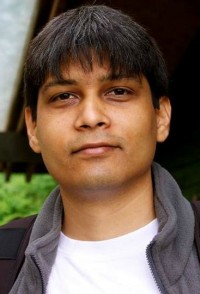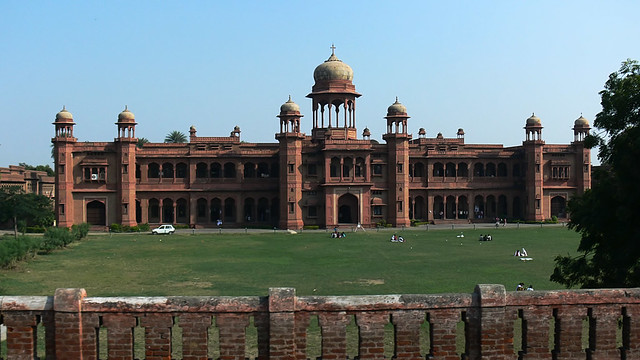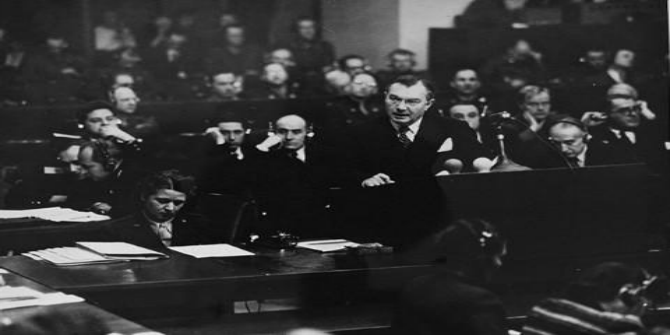 In this book, Kris Manjapara sets out to explore patterns of connection linking German and Indian intellectuals from the nineteenth century to the years after the Second World War. The author attempts to trace the intersecting ideas and careers of a diverse collection of individuals from South Asia and Central Europe who shared ideas, formed networks, and studied one another’s worlds. Ankit Kumar recommends this book to those studying world history, geopolitics, postcolonialism and development.
In this book, Kris Manjapara sets out to explore patterns of connection linking German and Indian intellectuals from the nineteenth century to the years after the Second World War. The author attempts to trace the intersecting ideas and careers of a diverse collection of individuals from South Asia and Central Europe who shared ideas, formed networks, and studied one another’s worlds. Ankit Kumar recommends this book to those studying world history, geopolitics, postcolonialism and development.
 Age of Entanglement: German and Indian Intellectuals across Empire. Kris Manjapara. Harvard University Press. January 2014.
Age of Entanglement: German and Indian Intellectuals across Empire. Kris Manjapara. Harvard University Press. January 2014.
“There was a time when German nationalism was a prime force challenging the idea of Europe, just as Indian anticolonial nationalism was a prime force challenging the idea of Empire.” (p.1)
With this first sentence, Kris Manjapara beautifully summarises the ideas covered in his recent book Age of Entanglement. Manjapara is assistant professor at the Department of History and co-director of the South Asia Digital Humanities Lab at Tufts University. His work is of particular relevance to those interested in Marxism, anti-colonialism, and cross-cultural encounters. This book also speaks to these topics in parts. It is certainly about Germany-India relationships but, more importantly, it is also about knowledge systems, their hegemonies and a struggle against these hegemonies. Manjapara very carefully and expertly opens a window into two past struggles against hegemony, in Germany and India, struggles that were geographically separated but intellectually attached.
The author focuses on three specific phases of German-Indian relationships: 1815-1880; 1880-1945; and beyond 1945. In the first phase, German institutions, scholarship and intellectuals helped the British Empire build colonies and strengthen colonialism. The second phase saw campaigns against the Anglocentrism of the world by the Germans and against colonialism by the Indians. The third phase was a period of delinking, shaped by the politics of Cold War and theoretical delineation of the ‘Third World’. However, it is evident that what fascinates Manjapara most are the entanglements, two way flows, exchanges of peoples, knowledges and materials that developed between 1880 and 1945.
Manjapara argues that from 1880 to 1945 both the Germans and the Indians were using each other as ‘instruments’ against the same entity, however, for different causes: one to break the Anglocentric hegemony of Europe and the other to “break apart the ideal of Empire” (p.6). Through the understanding of these collaborations he aims to infuse “realpolitik into the study of transnational intellectual history” (p.6) and (re)understand an era that he defines as “post-enlightenment” (p.7). It is surprising how skilfully Manjapara manoeuvres through the fields of “theoretical physics, international economics, Marxist criticism, geocultural studies, psychoanalysis, and expressionist art theory and practice” (p.11), dedicating separate chapters to them.
The book is divided into two parts. The first, entitled ‘Stages of Entanglement’, consists of four chapters. The first chapter examines the Germans during the British Raj concluding that the German scholarship engaged with the Indian knowledge systems much more seriously than the British. The next chapter moves on to discuss the turn of the Indian nationalists from “Imperial to International horizons” (p.54) and the rising role of Germany and the German language for Indian knowledge systems, thus beginning the entanglements. The third chapter investigates the rise of the Nazi regime in Germany and the breakdown of German-Indian exchanges. The last chapter in this section starts with a discussion around the First World War and ends with a discussion of the Second World War when many Indian nationalists collaborated with the Nazi Germany, motivated in part by the “politics of opportunism” and the momentum from decades of anticolonial movements (p.108).

After setting the historical stage, the second section of the book indulges into various “fields of encounters” by focusing on physics and economics in the first two chapters (fifth and sixth chapters of the book). In the seventh chapter, Manjapara opens up the world of Marxist exchanges. This is an important contribution because it goes beyond the commonly known roles of Russian Marxists and the influences of Russian Communism in India and opens up the lesser known influences of German Marxism. He begins by arguing that Marxism’s focus on the links between labour and social resistance was a precursor for the conceptualisation of “capitalism and colonialism as related forms of exploitation” (p.172). Its exchanges with Orientalism initiated a new understanding of the colonies as “spaces of disturbed and diminished social life” (p.175). Thus, colonisation of Asia became an instrument for the “Marxist ‘Red Orientalism’ ” to contest capitalism. On the other side, Marxism gave Indians a platform beyond the imperial boundaries to claim knowledge leadership. The German Socialist movement influenced a new understanding in India which combined socialism and Gandhianism. Thus, for Indians, Marxism became “more an arena of transit and entanglement, than an ideology” (p.182). However, German and Indian Marxists later parted ways on the “old Marxist problem of nationalism versus labour universalism” (p.189). Therefore, an attempt to “undermine the global hegemony of nineteenth-century Anglo-Saxon power led to new power plays and new universalist visions to legitimate them” (p.190).
The next three chapters of the book engage with the cultural exchanges, the dialectics of the psychoanalytical arena and the artistic world that lead to the formation of one of the first Bollywood studios: the Bombay Talkies. In the last chapter, Manjapara opens up a discussion of a “new world order” created post-1945 when the German identity became highly dependent on its American and Russian associations (p.277). In this era, the Third World Marxists sought to “delink the Global South from the power blocs of the Global North” but couldn’t “prevent underdevelopment (from becoming) a form of identity in the postcolonial world” (p.280, referring to Akhil Gupta). These unravelled in a competition between West and East Germany, but with very different approaches. The West Germans brought “methods and technologies” and “technological culture” to develop India and also to reinvent themselves as the “beacon of the normative West” (p.281-282). In contrast, what the East Germans lacked in resources, they made up with cultural exchanges and scholarship, initiating a constant exchange of scholars, thinkers and historians between the two countries. With this Manjapara concludes this very gripping narrative of entanglements of the “the joint rebellion of Germans and Indians against the legacies of the nineteenth century” (p.290).
This excellent work by Kris Manjapara could however be criticised for being too wide on one side and two narrow on the other. In the book he uses the phrase ‘German intellectuals’ for a population much wider than what we currently know as Germany. However, when he talks about ‘Indian intellectuals’ he refers to thinkers from a small part of India- Bengal (p.8). This skewed view may have limited the understanding of entanglements that an ‘Indian’ approach could have brought. To be fair to Manjapara, several prominent intellectuals from other parts of India do figure in the book, however, in limited capacities. The book should strongly appeal to a wide range of academic and non academic readers, and may be of particular interest to those studying world history, geopolitics, post-colonialism and development.
———————————–
Ankit Kumar is a doctoral researcher at the Department of Geography, Durham University and Durham Energy Institute. His PhD research tries to understand the politics of energy access in India by connecting the themes of energy and development. Beyond the PhD his wider research interests revolve around the questions related to energy, climate change, development, governance and politics. Before starting his PhD research Ankit spent about 4 years working on renewable energy and carbon finance project development. He blogs at www.ideatingenergy.com and tweets at @ideatingenergy. Read more reviews by Ankit.








2 Comments